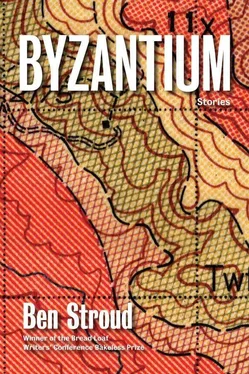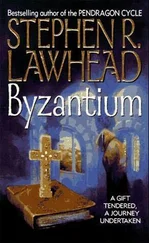Mota had taken the Zacatecas route dozens of times. Lulled by its familiarity and by the easy tread of his horse, he let his mind open, caught and followed every memory, every thought: the morning his mother helped him dress for an interview with the priest to see if he had a vocation, the eight long days spent tracking a smuggler in the mist-swaddled mountains south of Oaxaca. He’d become so lost in memory’s thicket that when, four days out of the city, Father Pascual began talking, Mota at first didn’t notice.
“It is not one mine but several,” Father Pascual was saying to the others, “that run along a single rich vein in a box canyon deep in the mountains.”
Mota had pressed Father Pascual for details of Tayopa ever since they set out, but the man had refused to speak. All he knew were the rumors — that it lay beyond the farthest edge of Nueva Vizcaya, that the Jesuits who’d found it had worked it in secret so as not to pay the royal fifth, that the Indian uprising that had engulfed the northern provinces two years before had supposedly begun when the Jesuits’ Yaqui slaves revolted. For years stories had circulated throughout New Spain, filigreed by each teller’s imagination. That the Jesuits were building a grand desert city reached by flying boats was one of Mota’s favorites, delivered from the tooth-scarce mouth of a coffee seller in Mérida as he trudged through the street beneath his urn.
“The country is empty and twisting,” Father Pascual continued. “You could search for a dozen years and not find the mine. As much for secrecy as for fear of getting lost, no one was allowed to leave the canyon once he entered, except two of our brethren, who took the silver — only a fraction of it, mind you — to a mission near the coast, where it was packed in shipments of pilgrims’ sandals bound for Rome.
“My third year at Tayopa I became attached to a youth of sixteen. I taught him our language, and when we were discovered we were punished. One night he and I escaped together. I planned to draw a map as we fled and sell it to the governor of Culiacán, to fund our new life. But my youth was killed by one of the Tepehuán guards who patrolled the outer paths. I had not been seen, and I ran in terror, blindly, through country I had crossed only once before. One month later the Yaquis rose and slaughtered the other Jesuits and the Tepehuáns. I hid in a mangrove swamp along the coast, getting provisions and news from a fishing camp of friendly Mayos, then made my way down to the city. Two years have passed since that Tepehuán guard took my happiness, two years during which I mourned and hid in fear of the Society, and I care for nothing now except that I get my pay and can flee this country.”
For a few moments the five rode in silence. Then El Sepo spat. “He is a bugger. He admits it.”
Mota looked at Father Pascual. He remembered the slender, dark-haired courtier’s son who moved from bed to bed during his Salamanca days, thought of the rustlings he sometimes overheard in the camps. Such pleasures occurred, but one never spoke of them. “Are you?” Mota asked.
“I am,” the ex-priest said. “And I suppose you could kill me.” Here he paused, as if granting them the opportunity. “But then you wouldn’t find the mine.”
FIVE DAYS LATER they reached the shallow valley that was Zacatecas. The town lay sprawled below, spread before them like a felled giant, dormant in the late-afternoon sun. The mines, the camps, the stamping mills — all were silent, abandoned. In the refining yards, where normally teams of men stood in the quicksilvered sludge, chanting as they turned it with shovels, weeds now grew and piles of rusting tools awaited buyers. Mota had not visited Zacatecas in some time, but he had heard of its troubles. Two years ago the Crown had called in the miners’ quicksilver debts, and immediately a third had gone bankrupt. Then four of the mines flooded, and not a month later came the worst calamity: the Santa María, the last of the rich mines, lost its vein.
Once they passed the emptied mining works they gained the town proper. Half the houses were shuttered, and those that weren’t were flung open, flashing their gutted insides like a poor man presenting his turned-out pockets to a thief. Even the beggars had gone. And yet people still lived here: the thin smell of wood fire slipped through the air, and before the tread of their horses two dogs paused in the street, whined, and trotted on.
After a few hundred yards the Plaza de San Agustín opened before them, squared by four oak trees whose overburdened limbs knelt to the ground. Mota halted, the others pulling up behind him. The lodgings he had counted on were boarded up. As he contemplated the wide, blank wall of the convent that formed the plaza’s west side — it, at least, was in good repair — he drank from his waterskin. Then, without an exchange of words, Mota guided the others up the next street, toward the Plaza Pública, where he remembered a tavern. They were halfway there when a man in a dusty velvet coat and dirt-stained shirt shot out in front of them from the large stone house on their right. The man waved his hands for them to stop. It took Mota several moments before he recognized him as Don Ignacio Peñafiel, the town’s alcalde. Two years before he’d been fat, his lace cuffs like the traceries of powdered sugar decorating a pastry. Those lace cuffs, blackened with grime, now sagged from bony wrists.
“Don Juan,” Don Ignacio said to Mota. “I almost don’t believe my eyes. What brings you here?” The alcalde looked at the others, his jowls and neck loose with lost flesh. “You must be hungry, tired. Please, do me the honor of a visit. All your party are welcome to my home.”
As soon as Mota accepted the offer, Don Ignacio turned and whistled, and two sour-faced Tepeque servants ambled from the house and guided the horses and mules into the courtyard. The animals stabled, Don Ignacio invited the white men to his second-floor parlor — Baltazar and El Sepo, Indian and mulatto, were to stay behind with the beasts — and begged them to sit while he busied himself at a broad, creaking credenza along the back wall, unlocking one of its cabinets with a key tied around his neck. Mota looked about the room. At first glance, it seemed in order, but on closer inspection he noted pale beards of dust hanging from the walls, holes in the curtains where insects had gnawed unchecked.
A pleased sigh emerged from the credenza, and, inching back out, Don Ignacio brought forth a half-emptied bottle of Madeira. After he stood he straightened his loose trousers and coat, then poured precise, small volumes of the wine into four glasses. He handed Mota the first.
“I hope you have not come to tax us more,” Don Ignacio said.
“Don’t worry,” Mota answered. “My business is to the north.”
“Is it?” Don Ignacio asked, then moved away to hand around the other glasses.
“Far to the north,” Mota said. He sipped his Madeira. “But I confess,” he added, “I never expected to find Zacatecas in such straits.”
“Temporary, temporary,” Don Ignacio said. “The vein will be found. The mines will be drained. The Crown will show mercy. I’m sure of it.” He sat in the high-backed, spindle-legged chair he’d saved for himself, then looked at Mota, Fernando, and Father Pascual in turn. “Come now. I have heard a story. You are seeking Tayopa.”
Mota shifted in his seat, turned his glass in his fingers. “It is just that,” he said. “A story.”
Don Ignacio grinned. “I’ve heard slabs of silver were left there, sitting out, waiting to be taken. I have two daughters in the convent. They send me tearstained letters. Their habits give them rashes.
They freeze at night and the nuns take away their blankets. One slab — just one slab — would see them married off.”
Читать дальше











